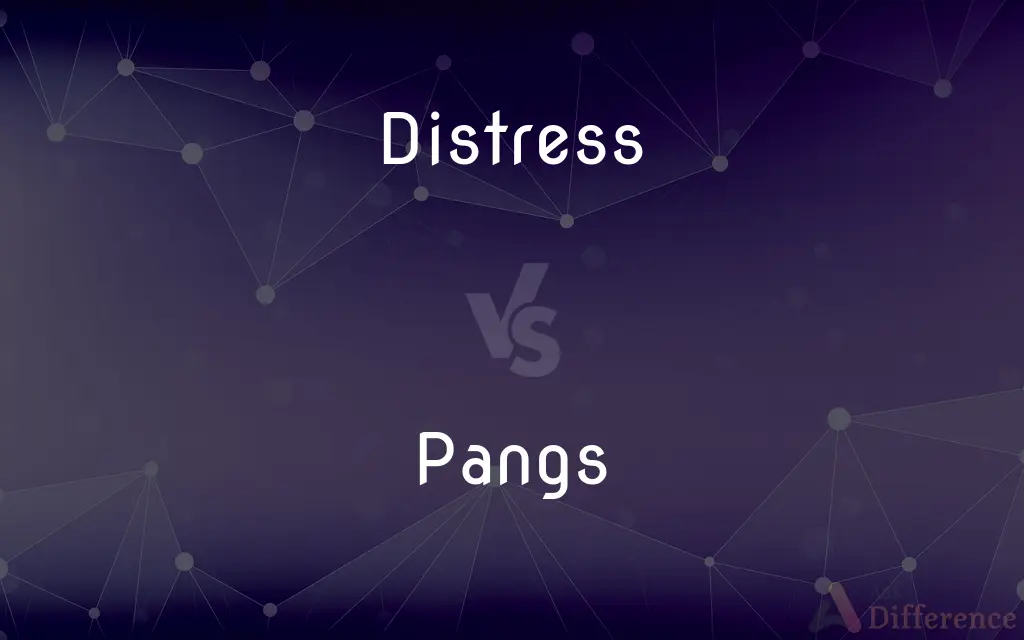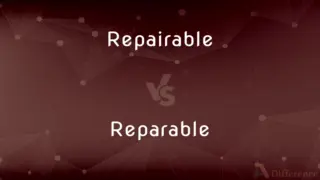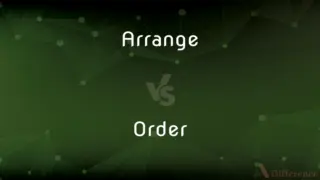Distress vs. Pangs — What's the Difference?
By Fiza Rafique & Maham Liaqat — Updated on April 8, 2024
Distress is a deep emotional or psychological pain, often with a broader context, while pangs are sharp, sudden feelings of pain, either physical or emotional.

Difference Between Distress and Pangs
Table of Contents
ADVERTISEMENT
Key Differences
Distress encompasses a wide range of intense negative feelings, including anxiety, sorrow, and pain, affecting an individual's overall well-being. On the other hand, pangs refer specifically to acute episodes of pain or discomfort, typically brief and sharp in nature, such as hunger pangs or pangs of guilt.
While distress can be chronic, affecting individuals over extended periods and potentially leading to long-term psychological issues, pangs are usually transient, lasting for a short duration and often related to specific incidents or stimuli. For instance, one might experience distress due to ongoing personal problems, whereas pangs might occur when reminded of a specific regrettable action.
Distress often requires a comprehensive approach for management or treatment, possibly including therapy or medication, due to its deep-seated and pervasive nature. In contrast, pangs, being more momentary, might be alleviated through immediate actions or changes in situation, such as eating to satisfy hunger pangs or making amends for a wrong to ease guilt.
The term "distress" is used in a broader context in psychology and medicine, indicating a state that may have multiple causes and might not have a simple solution. Pangs, however, are more specific and can often be attributed to identifiable causes, such as physical need or emotional reactions to specific events.
In literature and everyday language, "distress" conveys a sense of severe trouble or suffering, often invoking a response of empathy or the desire to help. "Pangs," however, often appear in contexts emphasizing the suddenness and sharpness of the experience, such as the pangs of separation or the physical pangs of childbirth.
ADVERTISEMENT
Comparison Chart
Nature
Psychological or emotional pain
Acute, sharp feelings of pain
Duration
Can be chronic
Usually transient
Management/Treatment
May require therapy or medication
Often resolved with immediate action or change
Context of Use
Broad, in psychology and medicine
Specific, often physical or emotional reactions
Literary Use
Conveys severe suffering
Emphasizes suddenness and sharpness
Compare with Definitions
Distress
Severe anxiety, sorrow, or pain.
The news of the accident caused her great distress.
Pangs
Sudden sharp pains or spasms.
After running the marathon, he felt pangs in his legs.
Distress
A state of danger or desperate need.
The stranded hikers were in distress and required immediate rescue.
Pangs
Brief, intense feelings of emotional pain or guilt.
She felt pangs of guilt for missing her friend's wedding.
Distress
Psychological suffering affecting well-being.
Long-term unemployment led to significant psychological distress.
Pangs
Acute episodes of physical discomfort, such as hunger.
Skipping lunch caused him to experience severe hunger pangs.
Distress
Emotional or physical strain or stress.
Financial troubles have put the family in considerable distress.
Pangs
Sharp attacks of distressing emotion, especially remorse.
His betrayal of a friend caused him deep pangs of remorse.
Distress
A condition requiring relief or aid.
The charity aimed to provide assistance to those in distress.
Pangs
Moments of acute longing or yearning.
Moving away from home brought on pangs of homesickness.
Distress
Extreme anxiety, sorrow, or pain
To his distress he saw that she was trembling
Her fingers flew to her throat in distress
Pangs
"Pangs" is the eighth episode of season 4 of the television show Buffy the Vampire Slayer. It was written by Jane Espenson, directed by Michael Lange, and first broadcast on November 23, 1999.
Distress
Another term for distraint
Pangs
A sudden sharp bodily pain
Hunger pangs.
Distress
Cause (someone) anxiety, sorrow, or pain
I didn't mean to distress you
Please don't distress yourself
Pangs
A sudden sharp feeling of emotional distress
A pang of guilt.
Distress
Give (furniture or clothing) simulated marks of age and wear
The manner in which leather jackets are industrially distressed
Pangs
To feel sharp bodily pains.
Distress
To cause strain, anxiety, or suffering to.
Pangs
To feel pangs of distress.
Distress
To mar or otherwise treat (an object or fabric, for example) to give the appearance of an antique or of heavy prior use.
Pangs
Plural of pang
Distress
(Archaic) To constrain or overcome by harassment.
Distress
Anxiety or mental suffering.
Distress
Bodily dysfunction or discomfort caused by disease or injury
Respiratory distress.
Distress
Physical deterioration, as of a highway, caused by hard use over time
Pavement distress.
Distress
The condition of being in need of immediate assistance
A motorist in distress.
Distress
Suffering caused by poverty
Programs to relieve public distress.
Distress
(Law) The act of distraining or seizing goods to compel payment or other satisfaction for a debt or other duty owed; distraint.
Distress
Physical or emotional discomfort, suffering, or alarm, particularly of a more acute nature.
Distress
A cause of such discomfort.
Distress
Serious danger.
Distress
(medicine) An aversive state of stress to which a person cannot fully adapt.
Distress
(legal) A seizing of property without legal process to force payment of a debt.
Distress
(legal) The thing taken by distraining; that which is seized to procure satisfaction.
Distress
To cause strain or anxiety to someone.
Distress
(legal) To retain someone’s property against the payment of a debt; to distrain.
Distress
To treat a new object to give it an appearance of age.
A pair of distressed jeans
She distressed the new media cabinet so that it fit with the other furniture in the room.
Distress
That which occasions suffering; painful situation; misfortune; affliction; misery.
Affliction's sons are brothers in distress.
Distress
A state of danger or necessity; as, a ship in distress, from leaking, loss of spars, want of provisions or water, etc.
Distress
The act of distraining; the taking of a personal chattel out of the possession of a wrongdoer, by way of pledge for redress of an injury, or for the performance of a duty, as for nonpayment of rent or taxes, or for injury done by cattle, etc.
If he were not paid, he would straight go and take a distress of goods and cattle.
The distress thus taken must be proportioned to the thing distrained for.
Distress
To cause pain or anguish to; to pain; to oppress with calamity; to afflict; to harass; to make miserable.
We are troubled on every side, yet not distressed.
Distress
To compel by pain or suffering.
Men who can neither be distressed nor won into a sacrifice of duty.
Distress
To seize for debt; to distrain.
Distress
A state of adversity (danger or affliction or need);
A ship in distress
She was the classic maiden in distress
Distress
Extreme physical pain;
The patient appeared to be in distress
Distress
The seizure and holding of property as security for payment of a debt or satisfaction of a claim;
Originally distress was a landloard's remedy against a tenant for unpaid rents or property damage but now the landlord is given a landlord's lien
Distress
Cause mental pain to;
The news of her child's illness distressed the mother
Common Curiosities
Are pangs always physical?
No, pangs can also be emotional, such as pangs of guilt or longing, although they are often described in terms of physical discomfort.
How can distress be managed?
Distress may require a multifaceted approach, including therapy, lifestyle changes, and sometimes medication, depending on its causes and severity.
What is the main difference between distress and pangs?
Distress refers to a deep, often chronic state of emotional or psychological suffering, while pangs are acute, sharp episodes of physical or emotional pain.
Can distress and pangs occur simultaneously?
Yes, an individual can experience pangs, such as hunger pangs or pangs of guilt, as part of their overall state of distress.
What triggers pangs of guilt?
Pangs of guilt are typically triggered by actions or decisions that one perceives as wrong or hurtful to others, leading to momentary feelings of remorse.
What role do coping mechanisms play in dealing with distress?
Effective coping mechanisms, such as mindfulness, problem-solving, and seeking social support, are crucial in managing distress and preventing it from worsening.
Are pangs indicative of a serious problem?
While pangs can be intense, they are usually transient and can often be attributed to specific, identifiable causes. However, frequent or severe pangs, especially physical ones, should be evaluated by a healthcare professional.
Is there a way to prevent pangs of guilt?
Preventing pangs of guilt involves mindful decision-making and actions, ensuring alignment with one's moral and ethical values.
Is distress always negative?
While distress is typically seen as negative, experiencing and overcoming certain challenges can lead to personal growth and resilience.
How is distress measured or assessed?
Distress can be assessed through psychological evaluations, self-reported questionnaires, and clinical interviews, looking at the intensity and duration of the distressing feelings.
Do pangs have a psychological component?
Yes, especially emotional pangs, like those of guilt or homesickness, have a strong psychological component, reflecting an individual's emotional response to certain situations or memories.
Can lifestyle changes reduce distress?
Yes, lifestyle changes such as regular exercise, a healthy diet, and stress management techniques can significantly reduce levels of distress.
Can pangs lead to distress if ignored?
Ignored or repeatedly experienced pangs, such as those associated with chronic guilt or unaddressed needs, can contribute to a state of distress.
Are there any positive aspects of experiencing pangs?
Experiencing pangs, like those of guilt or remorse, can serve as catalysts for personal growth, prompting reflection, learning from mistakes, and fostering empathy.
What is the societal impact of widespread distress?
Widespread distress can lead to significant societal issues, including increased healthcare costs, decreased productivity, and a general decline in well-being.
Share Your Discovery

Previous Comparison
Repairable vs. Reparable
Next Comparison
Arrange vs. OrderAuthor Spotlight
Written by
Fiza RafiqueFiza Rafique is a skilled content writer at AskDifference.com, where she meticulously refines and enhances written pieces. Drawing from her vast editorial expertise, Fiza ensures clarity, accuracy, and precision in every article. Passionate about language, she continually seeks to elevate the quality of content for readers worldwide.
Co-written by
Maham Liaqat















































